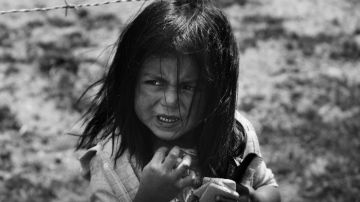Agent Forces 3-Year-Old to Pick Parent in Attempted Family Separation
A Honduran family in a Border Patrol holding facility in El Paso, Texas was told by an agent that only one parent could stay in the U

Photo: Unsplash/@roi_dimor
A Honduran family in a Border Patrol holding facility in El Paso, Texas was told by an agent that only one parent could stay in the U.S. and the other be sent to Mexico. The agent reportedly asked the youngest child of the family, 3-year-old Sofia, to choose which parent that would be. This is the latest instance in which the Trump administration’s policies continue to enable family separation at the U.S.-Mexico border.
According to the family, who spoke with NPR through an interpreter, “The agent asked her who she wanted to go with, mom or dad. And the girl, because [she] is more attached to me, she said mom. But when they started to take [my husband] away, the girl started to cry. The officer said, ‘You said [you want to go] with mom.'”
In the NPR interview, Robert Moore, a freelance reporter from El Paso profiles the family including Tania and Joseph, and their two children, their 9-year-old daughter, and their 6-year-old son, as they spent the last week ensuring they wouldn’t be separated. Their last names were omitted from the story because they are in the process of immigration proceedings.
The family tells NPR that a doctor helped examine Sofia – nicknamed Sofi – and pleaded with the agents not to separate the family. The family is part of a Trump administration program called Migrant Protection Protocols (MPP) which requires thousands of migrants from Central American countries “to wait in dangerous cities in northern Mexico while their immigration cases are handled by U.S. courts.” NPR had also reported last week that Sofi and her family were sent back to Juárez, Mexico, after crossing El Paso in April.
Due to a heart condition, Sofi was examined at the holding facility and their lawyer Linda Rivas of Las Americas Immigrant Advocacy Center asked that the family be removed from MPP. Rivas presented evidence from a Mexican health clinic that Sofi had suffered a heart attack but the judge said he didn’t have the authority to remove the family from MPP. However, the judge asked that the Department of Homeland Security (DHS) take note of this.
She was then examined by a DHS doctor who determined she had a serious heart condition. DHS guidelines state that people with “known physical/mental health issues” are exempt from MPP.
“They spoke to me at around 3 or 3:30 p.m. and they told me: ‘Sign here because we are giving you and your children permission.’ And I said, ‘I came with the children’s father,’ and he said, ‘Not him. Only you and your children.’ And the doctor said it’s important for the family to stay [together], and even the doctor said, ‘They entered as a family and they have to leave as a family,'” Tania told NPR.
That’s when the agent asked Sofi to pick a parent, insisting on the family separation despite the doctor’s recommendation. Upon realizing they might be separated from their father, NPR reports the kids clung to him yet he was still taken to a different cell.
“I was going to be separated from my children and my wife, and I would have to go back to Juárez on my own,” Joseph told NPR. “I felt devastated.”
The family was released last Friday to an El Paso migrant shelter. They then flew from El Paso to the midwest to stay with relatives. The family was seeking asylum after Tania witnessed the murder of her mother and her sister-in-law, who was also a witness, was tortured and killed so that she would be unable to testify. The family told NPR that the street gang MS-13 left them a note saying the family had minutes to flee the country and that’s what set them on their journey to seek asylum in the U.S.
“We cannot go back to Honduras,” Tania said. “We hope that the children could study here because in Honduras there are no opportunities for the children to go to school, for them to grow. We are honest people. We don’t want to harm anyone. We just want an opportunity.”
The American Civil Liberties Union (ACLU) reported that 2,654 children were initially determined to have been possibly separated from their parents as of October 15. The second-largest group of children between the ages of 5-17 comes from Honduras.
Though Sofi’s story is in some ways the story of these children, it’s unlike anything that’s recently been reported about the family separation happening at the border. Ultimately, it’s further proof of the inhumane treatment that’s happening at the U.S.-Mexico border as a result of the Trump administrations policies.

















